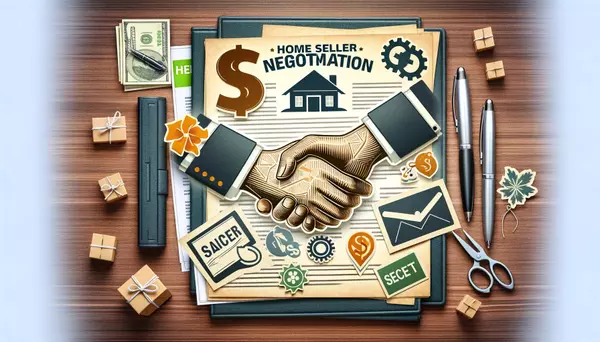
Should You Sell Your Home Fast for Cash?
Selling your home quickly for cash can be an enticing option, especially if you need to move fast or want to avoid the hassle of traditional home selling. However, it’s essential to understand both the benefits and drawbacks before making your decision. Here's a detailed look at what it means to sell your home for cash and whether it's the right choice for you. What Does It Mean to Sell Your Home for Cash? Selling your home for cash means accepting an offer from a buyer who can pay the full amount upfront without needing to secure financing. This often involves: Online House-Selling Platforms: Websites where you can list your home for cash offers. iBuyers (Instant Buyers): Companies that use technology to make fast offers on homes. Buy and Hold Investors: Buyers who purchase homes to rent out long-term. Home Flippers: Buyers who renovate and resell homes for a profit. These buyers typically bypass the traditional selling process, allowing you to avoid home prep, staging, showings, and a longer closing time. 7 Steps to Sell Your Home for Cash Request an Offer: List your home "as-is" and receive offers without needing to make repairs. Evaluation of Home Value: The buyer assesses your home, possibly sending a representative for an in-person evaluation. Contract Review: Review and decide whether to accept the offer. Inspections: The buyer may perform inspections to assess the condition of your home. Fast Closing: Without the need for financing approval, the closing can be as fast as 30 days. Clear Title: Ensure a clear title free of unpaid taxes or fees. Payment Disbursed: Receive cash via wire transfer before the close of escrow date. Advantages of Selling for Cash Speed and Convenience: Selling for cash is typically faster, avoiding lengthy processes like staging and showings. Certainty: With no financing contingencies, the sale is more likely to close as planned. Financial Benefits: Save money on repairs, avoid foreclosure, or get quick cash for a down payment on your next home. Disadvantages of Selling for Cash Lower Sale Price: Without proper marketing and staging, you may not get top dollar for your home. Repair Costs Reflected in Sale Price: The buyer will likely deduct the estimated repair costs from their offer. Difficult Negotiations: Cash buyers are often business-focused and less willing to negotiate on price. Conclusion Selling your home for cash can be a quick and convenient option, but it’s crucial to weigh the pros and cons carefully. Make sure to consider your specific situation and consult with a real estate professional. With experience working with both cash buyers and sellers, I can guide you through the decision-making process and help you get the best deal possible. For more tips on selling your home, check out our previous blog post, Home Seller Negotiation Secrets Ready to Explore Your Options? If you’re considering selling your home for cash or want to explore other selling strategies, contact Elizabeth Steele at MVP Realty. Let’s find the best solution for your needs! Elizabeth Steele PAProfessional Real Estate ConsultantMVP RealtyEmail: esteelerealestate@gmail.comPhone: 239-370-5988

Home Seller Negotiation Secrets
Selling a home is a significant step, and negotiations are a crucial part of ensuring you get the best possible deal. As both a buyer and a seller have opportunities to influence the final agreement, it’s essential to be well-prepared and strategic. Here are some essential tips to ensure a win-win outcome for everyone involved. 1. Be 100% Organized and Qualified Being well-prepared is key to successful negotiations. Here’s how you can ensure you have a strong position: Set the Right Home Price: Work with your realto to base your list price on current comparables. This ensures your home is competitively priced and attractive to buyers. Prepare Your Home: Ensure your home is ready to show. This can include decluttering, staging, and even holding open houses. Whether virtual or in-person, these open houses can create a sense of competition among buyers. Know Your Responsibilities: Understanding your obligations as a seller helps avoid any last-minute surprises. Make sure you know what you need to provide and prepare for each step of the selling process. Have Terms in Mind: Decide on the terms you are willing to negotiate. This can include the closing date, what stays with the house, and any contingencies. Use Counteroffers Effectively: Counteroffers with expiration dates can create urgency and prompt buyers to act quickly. Discuss with your realtor the best strategies for using counteroffers and concessions. Personal Tip: I always advise my clients to keep a checklist of tasks and documents. It not only keeps you organized but also gives you peace of mind knowing everything is in order. 2. The Questions to Ask Asking the right questions can give you a strategic advantage in negotiations. Here are some questions to consider: Who are you negotiating with? Understand the financial position of the buyer. Are they pre-approved for a mortgage? Do they have contingencies that might affect the sale? What strategic concessions are you willing to make? Decide beforehand what you’re willing to compromise on. This could be price adjustments, including certain appliances, or offering to pay for some closing costs. What comps are you up against? Know the competition in your area. Understanding what similar homes are selling for can help you position your home effectively. What do you have to negotiate with? Identify your strengths in the negotiation. This could be a desirable location, recent renovations, or unique features of your home. What are your non-negotiables? Determine the points you are not willing to compromise on. This clarity helps you stay firm on crucial aspects of the deal. Personal Tip: Every negotiation is unique, but having a clear understanding of these questions helps you navigate the process more confidently. 3. What’s Up for Negotiation? In home sales, it’s not just the price that’s negotiable. Many factors can be part of the negotiation process: Price: The most obvious point of negotiation. Be prepared to discuss and adjust your asking price based on market conditions and buyer feedback. Contingencies: Conditions that must be met for the sale to proceed, such as home inspections, appraisals, and financing. Terms: Specific details of the sale agreement, including the closing date, possession date, and any seller concessions. Occupancy: The date when the buyer can move in. Sometimes, buyers may need immediate occupancy, which could be a point of negotiation. Furniture: Items that may be included in the sale, such as appliances, light fixtures, or custom window treatments. Repairs: Any essential repairs identified during an inspection. Decide in advance how you will handle requests for repairs. Equipment or Tools: Items such as appliances, garden tools, or even maintenance equipment. Closing Costs and Fees: Costs associated with finalizing the sale. Be ready to negotiate who will cover these expenses. Personal Tip: Flexibility can be your best asset. Understanding that both sides need to feel they are getting a fair deal can help facilitate smoother negotiations. Negotiation Tips Here are some basic tips to navigate negotiations successfully: Know How to Receive an Offer: Understand your options when an offer comes in. Review the terms carefully and discuss them with your REALTOR®. Set a Bottom Line Price: Determine the minimum price you’ll accept. This helps you stay focused during negotiations and avoid accepting less than what’s reasonable. Remember That Price Isn’t Everything: Consider other factors like terms and contingencies that could add value to the deal. Set Intentions and Goals: Be clear about what you want to achieve. Setting goals helps guide your decisions and keeps you on track. Understand Contingency Clauses: Know the conditions that could affect the sale. This understanding helps you manage expectations and avoid surprises. Collaborate with a Qualified Agent: Work with a REALTOR® who can guide you through the process. Their expertise and experience are invaluable in achieving a successful outcome. My take: Communication is key. Keep an open line of communication with your realtor and be transparent about your goals and concerns. Ready to Connect? I'm here to help you navigate negotiations for optimal results in your home sale! Reach out to me, Elizabeth Steele, at MVP Realty, and we'll get started right away. Elizabeth Steele PAProfessional Real Estate ConsultantMVP Realtyrealestateservicenow.comEmail: esteelerealestate@gmail.comPhone: 239-370-5988
Recent Posts











